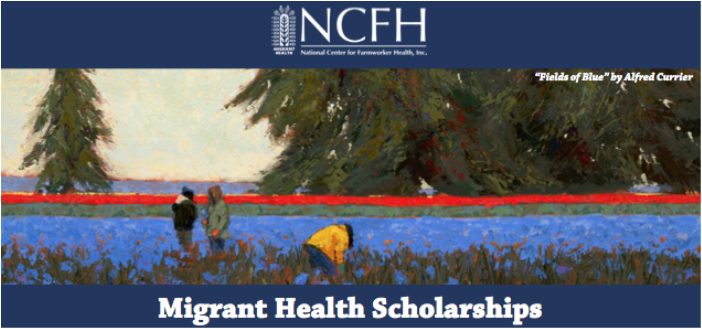 Christian Garcia is one of the six recipients to receive the 2016 NCFH Migrant Health Scholarship. Each year NCFH commissions an artist to create a piece with the theme of Ag Worker health. The artwork is then auctioned off at the annual National Agricultural Worker Health Conference. 100% of the proceeds go to the next year’s scholarship recipients. Recipients are emerging leaders who have a passion and determination to contribute to the success of the Migrant Health Movement. NCFH sat down with Mr. Garcia, who received the award last month in May. He works as a Regional Outreach Supervisor for Intercare Community Health in Michigan. Why are Migrant and Ag worker Health important to you? It’s important to me because it’s a part of my background. I have family in Mexico that are agricultural workers and my dad migrated to the US in the early 90s and worked as a migrant in agriculture for a couple of years until he settled here in Michigan. I always came to Intercare as a child. Then I just went to school and didn’t really have a plan and the opportunity came to work with migrant/seasonal farmworkers and I just absolutely loved it. It’s important to me because agricultural workers are a priority for our clinic and we do our best to promote health and promote a healthy living style. Being able to be there for the workers and provide those services to them is just an amazing thing to be a part of. Can you talk a little bit more about what you’re studying and how you’re going to apply that in Migrant Health? Right now I’m pursuing a Master’s Degree in Organizational Learning and Performance it includes a lot of strategic planning and management. It involves a lot of human resource components but the training side of it is how I want to apply it to the future. What I envision is creating a standardized outreach program that can be promoted throughout the nation. I want to be able to train potential social workers and community health workers using the strategies I’m learning in my degree. I want the Community Health Workers to have really great training so they can perform at a high level, and then apply this program on a national basis. You said your goal is to implement a standardized outreach strategy throughout the nation. What are some of the challenges you see with trying to implement larger outreach programs? I oversee the outreach program in our clinic with our VP. She and I collaborate to plan our outreach programs and I supervise the workers throughout the season and make sure the CHWs are well guided and working at a high level. Some of the challenges we would like to overcome in the next couple of years would be to recruit and retain enough people or students who can assist the outreach workers in the fields. This is a challenge though, because a lot of new staff have never really been involved in migrant health and are unfamiliar with migrant farmworkers and their specific barriers to access. Do you have migrant health 101 trainings for staff? We’ve created a training catalog that we utilized in our orientation this past year. It covers a lot of issues with agricultural workers and the issues to access and their specific health concerns. We cover the protocols our clinic has when visiting the fields. We teach new staff the role of the outreach worker, outreach nurse, and the role of the transporter. Everyone involved in increasing access to the farmworkers. In addition, we have an overall training on how to promote our clinic in the migrant camps. What are the main barriers for Migrant/Seasonal Ag Workers? Language is the main one. It’s difficult for both sides. We need bilingual staff out there and more so it’s difficult for our migrant workers’. Spanish is their second language and they speak a dialect. Overcoming that barrier would really increase access. Our goal as a leadership team is to be able to provide great guidance for our outreach teams and our program in general, and I hope to take it to a national level in the next couple of years. Perhaps promote our outreach trainings so other outreach programs in the nation and other health centers can adopt our system and overall increase access to health care for agricultural workers. Comments are closed.
|
The National Center for Farmworker HealthImproving health care access for one of America's most vulnerable populations Archives
July 2024
Categories
All
|


 RSS Feed
RSS Feed